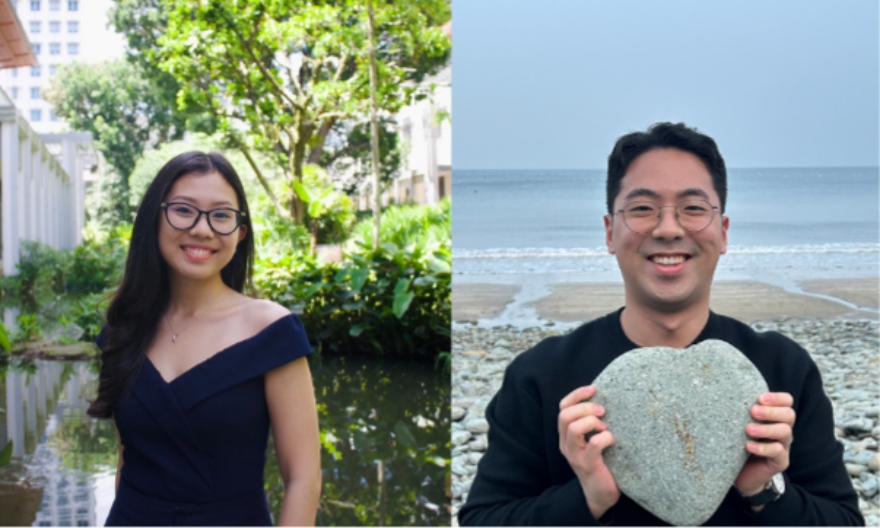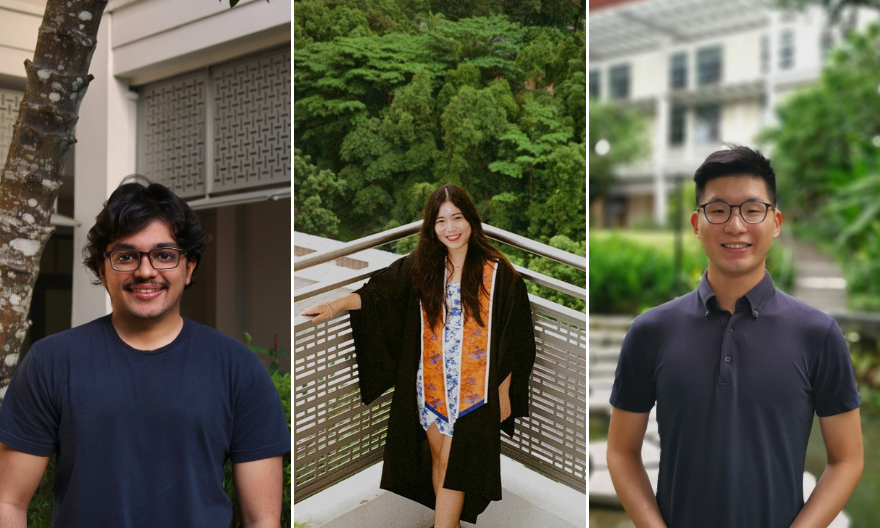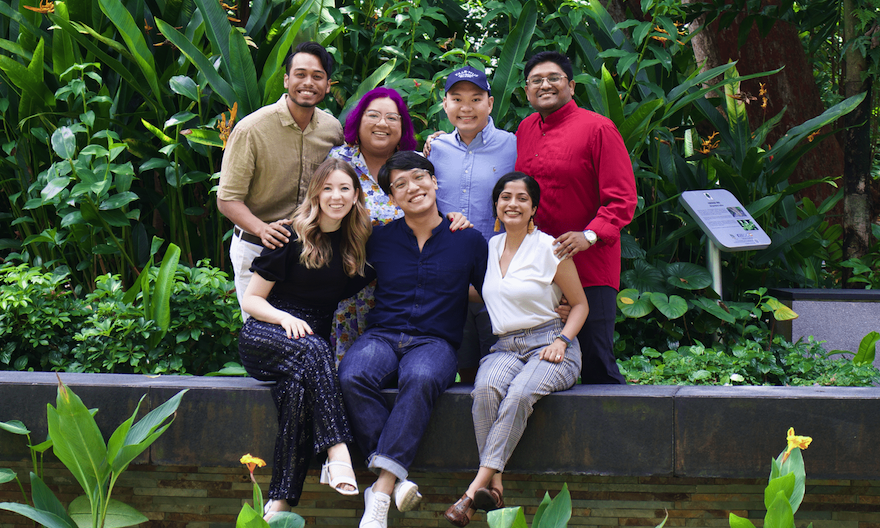Students and alumni contribute to environmental sustainability
Students and alumni pursue green efforts and careers to enable environmental sustainability
 From left to right: Tong Xueyin (Class of 2018), Cassidy Clark (Class of 2019) and Lim Lecarl (Class of 2024). Images provided by Xueyin, Cassidy and Lecarl respectively.
From left to right: Tong Xueyin (Class of 2018), Cassidy Clark (Class of 2019) and Lim Lecarl (Class of 2024). Images provided by Xueyin, Cassidy and Lecarl respectively.
Every week, Tong Xueyin (Class of 2018) works with companies in the agri-tech sector to build up their capabilities and support their efforts to innovate and internationalise.
Xueyin is a Development Partner with Enterprise Singapore (ESG). She contributes to the growing green economy sector in Singapore by being part of a team that provides financial and non-financial assistance to local agri-tech startups and small and medium-sized enterprises.
For Xueyin, this work is meaningful because it allows her to be on the ground and constantly exposed to new people and ideas. “I have always been interested in 3P – People, Private, and Public – partnerships as a means of solving wicked problems,” she said. “Although ESG is an economic agency, it provided me with an opportunity to observe how sustainability plays out in the private sector.”
“This experience has been rewarding as it allows me to take a step back and review how all the parts of the bureaucratic engine come together to drive industry change,” she added.
Xueyin attributed her passion for environmental sustainability to her summer study experience at Yale Summer School. There, she discovered how environmental sustainability encompassed many ideals, but often posed difficult to execute.
“I thought it was an intriguing and urgent problem that might be worth investing my life’s effort into,” she said.
Thus, after completing her Environmental Studies capstone project on the history and politics of bio-conservation in Singapore, Xueyin started to work for Climate Conversations, a people-centred environmental non-profit, before pursuing her Master of Environmental Management degree at the Yale School of Forestry and Environmental Studies (later renamed Yale School of the Environment).
Xueyin credited Yale-NUS College for instilling in her a “can-do” spirit which encouraged her to pursue a career in sustainability. “I have so much gratitude to my Professors, Rectors, classmates, and friends who nurtured me in my youth and genuinely shaped the way I think about community, hope, and action,” she said.
Like Xueyin, Cassidy Clark (Class of 2019) also works in the agri-tech industry. After graduating with a Bachelor’s degree in Philosophy, she learned about her current position at agrifoodtech startup accelerator GROW from a LinkedIn job opening posted by a Yale-NUS alumnus, Jon Ho (Class of 2017).
“I was inspired by GROW’s focus on environmental sustainability and social impact, especially because our food systems are a huge contributor to our various planetary crises,” she said. “The role looked like a great fit for my creative and communicative strengths. The position offered a flexible and collaborative working environment, and it was in an industry I was keen to get involved in, ” Cassidy added.
Cassidy cited an event organised by Climate Conversations in 2019 as her motivating factor for pursuing a career in environmental sustainability.
“It was that conversation that illuminated for me how the climate crisis is already happening in the places I care about, and causing and exacerbating other social and political crises,” she said.
Cassidy shared that the conversation about climate change also highlighted to her the different ways that people were already working collectively towards better futures and how she could play a part.
This newfound passion for the environment served as fuel for her work at GROW today, where she balances responsibilities in programme management, and marketing and communications. In her role, she works closely with a team that helps to develop the agrifoodtech ecosystem by connecting start-ups, investors, government bodies, and corporates, contributing to the global food supply network and Singapore’s “30 by 30” goal – to produce 30 per cent of the country’s nutritional needs locally and sustainably by 2030.
Cassidy highlighted that she picked up broad-based skills, such as the ability to think and communicate concisely, precisely, and logically during her time at the College. She added that her batchmates’ contributions to environmental efforts also served as “a continuous source of insight and inspiration” which led her to her current career path.
While Xueyin and Cassidy started a career in environmental sustainability after graduation, Lim Lecarl (Class of 2024) launched an environmental initiative with his classmates Yun Jeongjun (Class of 2024) and Stanley Tan (Class of 2024) while pursuing his undergraduate degree in Environmental Studies. Lecarl, Jeongjun and Stanley started Green Pins, a web application that maps and supports sustainable food and beverage (F&B) businesses in Singapore. The project initially started because the trio wanted to create an initiative that would have a sustainable impact.
“We got together to form a team and submitted a project proposal in the Global University Climate Forum. There, we shared ideas, learned, and connected with students from 44 different countries, and had conversations about environmental sustainability through webinars and workshops,” Lecarl said.
Though juggling this project as a full-time student was not easy, the team found support from the Yale-NUS community. Lecarl said, “The Yale-NUS community, especially alumni mentors, faculty, and staff, helped us by asking questions that we had not considered, pointing us to resources we did not know we need, and affirmed us when the going got tough.”
The project has since developed into a work-in-progress application. By listing sustainable F&B businesses through the application, the team rewards sustainability initiatives by promoting them to environmentally conscious consumers.
The team also hoped to inform, encourage and empower consumers to eat sustainably, thus building meaningful partnerships between F&B businesses and organisations working on food-related issues.
Lecarl said, “This project has given us the opportunity to learn more about the local food sustainability scene: their goals, their impact, how we could value-add to their mission, and connect them with other efforts to create synergies.”





